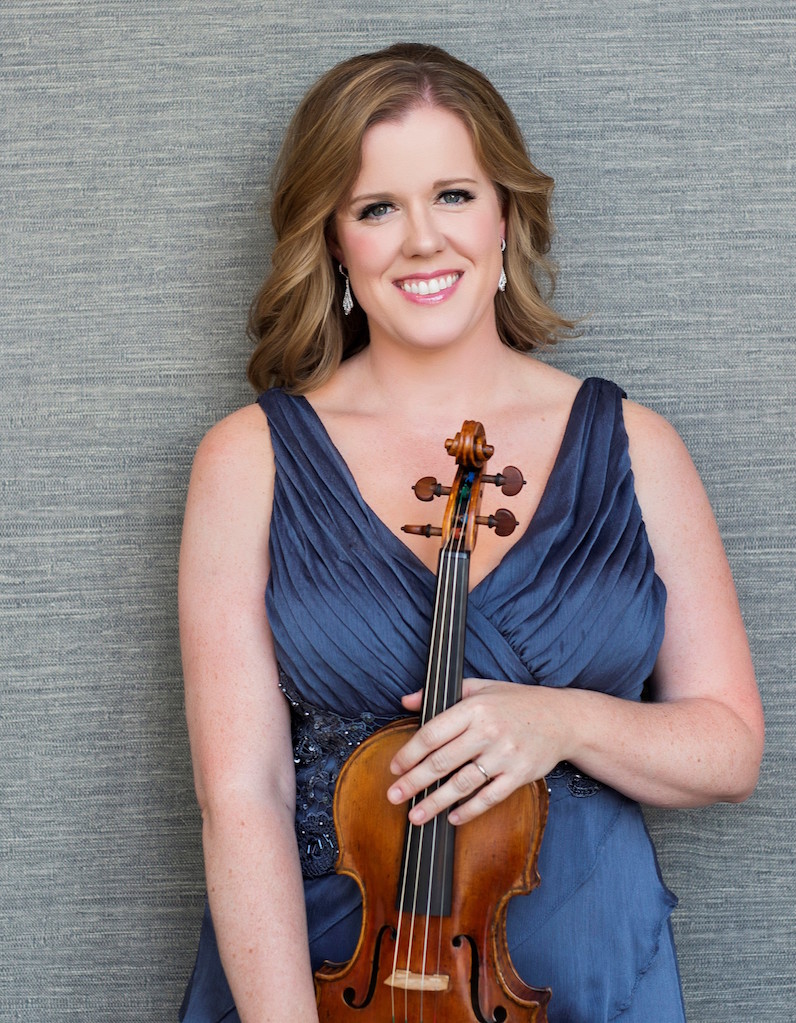NOVA Chamber Music starts a new era with wide-ranging diversity

Violinist and music director Madeline Adkins performed in the season-opening concert of the NOVA Chamber Music Series Sunday afternoon.
Sunday’s season-opening concert of the NOVA Chamber Music Series saw the debut of Madeline Adkins as the group’s new music director. For the occasion, Adkins, who also serves as the Utah Symphony’s concertmaster, chose a wonderfully diverse yet cohesive program to open the ensemble’s 41stseason.
Diverse, since it brought together a wide spectrum of composers, from Mozart to Schoenberg; cohesive, because the younger composers on the program were either influenced by, or taught by, the older composers.
The highlight of the matinee concert at Libby Gardner Concert Hall was Schoenberg’s monumental string sextet, Verklärte Nacht (Transfigured Night). Written in 1899, it is without question the composer’s most significant pre-12-tone work. In its extreme chromaticism, it’s a true summing up of 19th century tonality while at the same breaking it down and opening up new possibilities and new means of expression.
Schoenberg later arranged the piece for string orchestra, but Verklärte Nacht is most effective in its original form. The sextet version conveys the meaning of the Richard Dehmel poem on which it is based more vividly, and the music has greater intensity and power.
The players were Utah Symphony colleagues Adkins and Claude Halter, violins; Brant Bayless and Elizabeth Beilman, violas; and Rainer Eudeikis, cello. (They were joined by Ballet West principal cello Joyce Yang.) The sextet of musicians exhibited finely honed ensemble playing that captured the potency of the poem. Their nuanced reading underscored the searing conflict central to the poem (the unnamed woman telling her partner that she is pregnant with another man’s child) and its peaceful resolution.
Also on the program was Fantasien über Gedichte von Richard Dehmel (Fantasies on Poems by Richard Dehmel) by Alexander von Zemlinsky, Schoenberg’s teacher.
Zemlinsky’s music is unjustly overlooked these days, and his piano work was played by Andrew Staupe, who brought an expressive interpretation that served the mostly dreamy, contemplative character of the first two pieces well. The third, dealing with love, was given an impassioned reading, while the final piece was treated with apt lightness and humor.
Staupe was joined by mezzo-soprano Aubrey Adams-McMillan and violist Bayless for Brahms’ Zwei Gesänge, Op. 91. Adams-McMillan’s rich, mellow voice lent itself well to the dark-tinged “Gestillte Sehnsucht,” and she brought finely nuanced lyricism to “Geistliches Wiegenlied.” Staupe and Bayless offered subtle accompaniment that let Adams-McMillan’s voice shine as the focal point of the music.
Rounding out the concert was Schubert’s Quartettsatz and Mozart’s two-movement Sonata for Piano and Violin in E minor, K. 304.
The Schubert was played by the newly formed Fremont Quartet, consisting of Adkins, Halter, Bayless and Eudeikis. They gave a well-crafted reading that was lyrical even in the dramatic moments, allowing each individual part to be distinctive while creating a seamless whole.
Adkins and Staupe teamed up for an account of the Mozart sonata that was understated while managoing to capture the music’s somber character of the music. While the piano dominates the proceedings in this work, the two players nevertheless created a fine balance that allowed them to be equal partners.
NOVA Chamber Music Series’ next concert takes place 3 p.m. November 18 at Libby Gardner Concert Hall. The all-English program includes Imogen Holst’s Phantasy Quartet; Henry Purcell’s Chacony in G minor, Thomas Adès’s, Court Studies from The Tempest, Benjamin Britten’s Cello Sonata, and William Walton’s Façade. novaslc.org